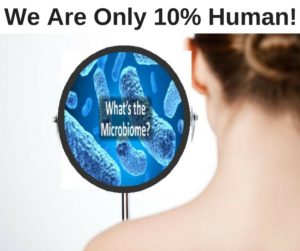In 2001 the term Microbiome was coined by a researcher named Joshua Lederberg. The term applies  to the 100 trillion microbial cells that each person carries on and in their body.
to the 100 trillion microbial cells that each person carries on and in their body.
Whether you believe in evolution or Creation there is a symbiotic relationship between these microbial cells and human cells. A symbiotic relationship that either leads to good health or poor health.
In fact when you look in the mirror what you see is your human expression of your human cells. However, if you had the eyes of a powerful microscope you would see a world of microbial cells that outnumbered your human cells by a factor of 10.
Which has lead researchers in the area of the microbiome to use the phrase “We Are Only 10% Human!”
Why is this important?
Because the makeup of your micriobiome significantly, if not entirely, impacts your health and wellness. To the point where every major disease and illness today has a link back to your microbiome.
Your Microbiome Significantly Impacts Your Body Composition
People used to blame their human genes for being overweight. And because of this they felt powerless to change their physical appearance.
But microbiome research, especially looking at your gut microbial communities, clearly shows this plays a far greater role in determining whether you are lean or fat.
Which means that if you change your internal gut microbiome you can significantly improve your ability to process food so that you use food for energy instead of storing it as fat.
Allowing you to physically reshape yourself and address most of the metabolic health issues associated with being overweight and obese like diabetes, cancer, and cardiovascular diseases.
What is the Microbiome?
According to Merriam-Webster your micriobiome is
“A community of microorganisms (bacteria, fungi, and viruses) that inhabit a particular environment and especially the collection of microorganisms living in or on the human body. Your body is home to about 100 trillion bacteria and other microbes, collectively know as your microbiome.”
So what does this mean? On and in your body there are 4 major microbial communities.
Oral
Skin
Vaginal
Fecal/Abdominal
And when added together represent about 100 trillion microscopic organisms.
This means that 10% of your cells contain human DNA. And the remaining 90% of your cells are some combination of bacteria, fungi, and microflora.
To help you better understand this let’s talk about “genes”, which are the building blocks of life. Genes carry the genetic instructions that shape and form every living thing.
There are 22,000 genes in the entire human genome.
There are 3.3 million (3,300,000) genes just in the human gut mircobiome.
This diversity in the gut microbiome is huge and plays a significant role in determine your overall health and wellness.
How does your Microbiome play out in everyday living?
Individual humans are about 99.9% identical to one another as it relates to their human genes. However, they could be 80-90% different from one another in terms of their microbiome.
And while the microbial communities on your skin, your mouth, and your reproductive areas are important, it’s the micriobiome of the gut or abdominal cavity that plays the greatest role in determining your overall health.
What this means is the genetic diversity found in your gut microbiome allows you to digest compounds via enzymatic and metabolic pathways not explicitly coded in your human genome.
And it’s this diversity that allows you to properly extract energy as well as help your immune system function properly. In fact every organ system in your body is effected by the chemical compounds produced by your microbiome.
If you put this into environmental terminology, you are one large chemical processing plant. And you’re either polluting yourself with toxins leading to poor health.
Or you’re fueling yourself with clean environmental compounds that allow you to live a healthy and vibrant life.
And you’re transitioning between these two ends of the health spectrum based on your daily choices. Choices that either support a healthy micriobiome or create a condition called dybiosis, which contributes to most of the lifestyle diseases facing people today.
We’ll look at how your microbiome effects these lifestyle diseases in future posts.
Leave a Reply
You must be logged in to post a comment.